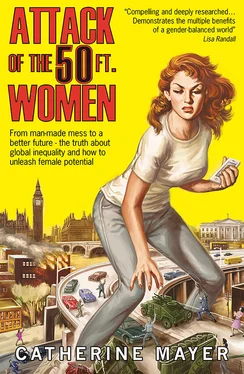A month later, I encountered Boris Johnson’s father, Stanley, a former Member of the European Parliament, at the birthday gathering of another politician. ‘Catherine,’ he shouted across the room. ‘I heard some terrible news about you!’ The room fell silent, heads swivelled. ‘I heard you’d become a feminist!’ Later that evening I talked to a Labour peer who berated me for splitting his party. This was a feat Labour was managing without external help. At the same event, prominent members of Labour and the Conservatives confessed they’d voted for us. Westminster was no longer patronising and dismissing us, but it wasn’t yet sure what to make of us either.
WE’s second year was more eventful still. Our first party conference in Manchester in November 2016, attended by 1,600 delegates, adopted a raft of new policies including a seventh core objective, equal health, and ratified an internal party democracy devised to give branch activists a guaranteed presence on decision-making bodies and ensure real diversity on those bodies. We ran campaigns that had significant impact such as #WECount – mapping sexual harassment, assault and verbal abuse directed against women. Tabitha Morton ran for WE in the first race to be Metro Mayor of the Liverpool’s city region, spurred to do so because the region had no strategy for combating violence against women and girls, despite having the UK’s highest reported rates of domestic violence. After the election she was asked by the winner, Labour’s Steve Rotheram, to help him to implement the strategy she made central to her campaign.
We began detailed work with other parties too. The Liberal Democrats asked for help in drafting legislation to combat revenge porn – the disclosure of intimate images without consent. Several parties and politicians opened conversations with us about much closer cooperation, including the possibility of alliances and joint candidacies.
We didn’t expect to road-test these ideas before the general election scheduled for 2020. Our plan was to build up our war chest ahead of that deadline and gain experience and exposure by participating in the May 2017 local council elections and the contest for the newly created post of the mayor of the Liverpool region. Then, while those races were still under way, May called her snap election.
We fielded five candidates in England and one apiece in Scotland and Wales, on a radical and innovative platform that understood social care not as an unfortunate expense but the potential motor of the economy, and proposed fully costed universal childcare. Large chunks of our original policy document resurfaced in the manifestos of other parties. In the Yorkshire constituency of Shipley, Sophie Walker stood with the backing of the Green Party, in a progressive alliance. The joint WE–Green target was the Conservative incumbent, Philip Davies, a prominent antifeminist. We hoped Labour might join us – they had largely abandoned hope of the seat after serial defeats – but instead they chose to run and directed more of their energy against us than Davies. This reflected both Labour’s belief that it owns feminism and an overheated partisan culture that rejected all opportunities for electoral pacts across the UK.
Labour, like the Conservatives, continues to back the first-past-the-post electoral system even though it has been shown globally to exclude women and minority perspectives. Both Labour and Tories presented the election as a binary contest. Our candidates heard the same message from the left and the right: stand aside, women. In the final days of the campaign, our offices received hundreds of abusive phone calls and a death threat to Nimco Ali, our candidate in the London constituency of Hornsey and Wood Green. The letter, scrawled in capital letters and larded with Islamophobia, was signed ‘Jo Cox’. During Jo’s first and only year serving as a Labour MP, she had made a significant impact not least in advocacy for women before her brutal murder in June 2016. Nimco knew her as did I. This wasn’t the first time someone had tried to silence Nimco, who arrived in the UK as a child refugee from Somalia, survived FGM and co-founded Daughters of Eve, a non-profit organisation campaigning against it. The next day she and I went out canvassing together. I watched her, decked out in WE colours, utterly recognisable, meeting as many people as possible. She and our other candidates didn’t win seats, but they were all winners.
This book isn’t intended as a history of the party. These are still early days for us – and could be the end of days too. The challenges to the survival of our upstart initiative remain acute in a political system designed, like zombie Johansson’s breasts, to smother movement in the lower tiers. These challenges are also shifting and shape-changing with unprecedented speed since the UK began disentangling itself from the European Union and tangling instead with the demons the process is unleashing. The Referendum was conceived to reconcile internal strains within the Conservative Party, but did no such thing. Labour’s fault lines are at least as deep; things fell apart, the centrists could not hold on. As Labour’s left, resurgent under Jeremy Corbyn, battled for control of the party, fugitives sought a haven in the Women’s Equality Party. Some of them dreamed of repositioning us. ‘What I’d like is for the Women’s Equality Party to remake itself as the Equality Party,’ wrote the novelist Jeanette Winterson in the Guardian . ‘It’s a relevant name, a powerful name, and naming matters. I’d like to drop Labour and New Labour as words that don’t mean anything anymore. If you still needed proof of that after the last election, Brexit just gave it to you.’ 17
We did consider changing the name but most of us opposed the idea of dropping ‘women’ from our brand – that would mean becoming like all other parties and relegating women’s interests. And Brexit posed a danger to women as the process of decoupling raised questions over rights and protections anchored in Europe and guaranteed by Europe. When Parliament began considering legislation to trigger the Brexit process, an amendment we devised with the Greens drew the widest cross-party support of all such initiatives. Our vision was more relevant than ever. Whenever we shared it, we won new support, new members. Our first problem was, and remains, how to get our message out on meagre resources, in a media culture pre-programmed to diminish the importance of that message. The second problem is how to raise the money to keep going.
So a monograph on the Women’s Equality Party would be premature. I will, however, share insights from the process of starting the party. Journalists often suffer from the delusion of being intimately acquainted with the world. Work had taken me to six continents, war zones and pleasure domes, to interviews with dictators and democrats. It’s quite a lot like being married to a rock musician. You enjoy Access All Areas: ringside seats, freedom to roam backstage. These experiences foster understanding, but they don’t make you part of the band. As a journalist, I imagined I understood politics. As a journalist-politician-whatever, I now understand how imperfect that understanding was.
But my primary aim in writing Attack of the 50 Ft. Women is not just to mine lessons from the recent past and present, but to think about Equalia. What can today’s world tell us about the way to this promised land and what we might find when we get there?
In The Female Eunuch , the text that woke me and many others to feminism, Germaine Greer quoted Juliet Mitchell’s 1966 essay, Women – the Longest Revolution : ‘Circumstantial accounts of the future are idealistic and, worse, static.’ This is both right and wrong.
Читать дальше












